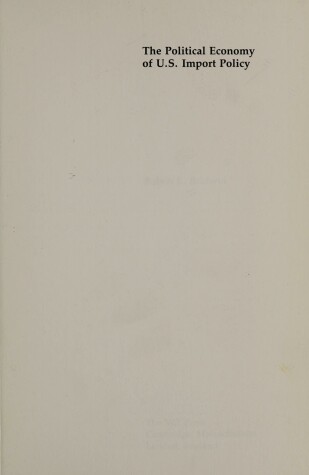Although trade-policy issues are becoming increasingly important, there is little rigorous analysis of the nature of the decision-making process that includes both economic and political factors. Using public choice theory as a framework, this book explains the manner in which U.S. import policies are determined and analyzes the types of economic and political factors that affect the policymaking of the Congress, the International Trade Commission, and the President and his advisors.The book's discussion of Congress focuses on the formulation and implementation of the Trade Act of 1974, in which Congress regained some of the trade-policy powers that it had delegated to the President. It explores both the appointment and decision-making process in the ITC, and statistically analyzes the factors influencing the President's acceptance of the ITC's findings in import relief cases and tests various hypotheses designed to explain interindustry variations in the tariff cuts offered by the United States in the Tokyo Round of multilateral trade negotiations.Baldwin finds serious fault in the interactive policymaking of the Congress, ITC, and the Executive Branch. In a concluding chapter he makes recommendations concerning the decision-making process in import injury cases and in antidumping and countervailing duty petitions, the appointment and the budgeting process for the ITC, and the interaction of the President and the Congress in multilateral trade negotiations.Robert E. Baldwin is Hilldale Professor of Economics, University of Wisconsin-Madison.
- ISBN10 026202232X
- ISBN13 9780262022323
- Publish Date 14 February 1986
- Publish Status Out of Print
- Out of Print 13 March 1992
- Publish Country US
- Publisher MIT Press Ltd
- Imprint MIT Press
- Format Hardcover
- Pages 250
- Language English
